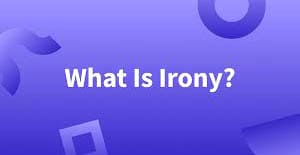Irony | Types of Irony
Irony | Types of Irony
Roughly to say, Irony is a literary device by which a speaker says one thing but means just the opposite. The term ‘irony’ has been derived from the Greek word ‘eiron’ which means ‘dissembler’. Literary, it refers to a device in which a speaker pretends to praise something or someone but means to blame or ridicule it or him. To say in other words, Irony is a tactful expression or representation of an idea, event, situation or circumstance with an implied or hidden meaning besides its literal or superficial meaning. An irony expresses two meanings or significances- one is obvious (literal or apparent) and the other is hidden or deeper (under the surface) meaning.
The real purpose of using Irony is to ridicule or blame a person or thing. It is the most insulting or invective means of criticism. Many times it is used to produce humorous or comic effects. For instance, we can quote the following lines from John Ruskin:
”The brotherly love of our enlarging Christianity is proved by the multiplication of murder.”
Here the author John Ruskin pretends to praise the brotherly love among the Christians but it means just the opposite because the ‘multiplication of murder’ can never be an instance of brotherly love.
We can put forward more examples of irony below-
- A good father! A good Husband! Ample apologies for fifteen years of persecution, tyranny and falsehood. – Macaulay
2. Are you so gospelled to pray for this good man and his issue? -Shakespeare.
3. Yet Brutus says, he was ambitious
And Brutus is an honourable man. -Shakespeare
Irony as a literary device may be of three types as- (1) Verbal Irony (2) Situational Irony and (3) Dramatic Irony
Verbal Irony conveys a meaning exactly opposite to its literal meaning or sometimes it means exactly what we say, but we say it in such a manner as to excite contempt or ridicule. The above-quoted examples serve the example of Verbal Irony. Verbal Irony is also called Sarcasm.
Situational Irony refers to a situation in which actions have an effect that is opposite from what is intended.
Dramatic Irony is to a narrative in which the audience shares with the author’s or speaker’s knowledge of the present or future circumstances of an event but the character in the story does not know. 0 0 0.
Types of Irony
N. B. The article ‘Types of Irony’‘originally belongs to the book entitled ‘Menonimus Dictionary of Literary Terms‘.
Types of Irony
Books on Literary Criticism by M. Menonimus:
- World Short Story Criticism
- World Poetry Criticism
- World Drama Criticism
- World Novel Criticism
- World Essay Criticism
- Indian English Poetry Criticism
- Indian English Poets and Poetry Chief Features
- Emily Dickinson’s Poetry-A Thematic Study
- Walt Whitman’s Poetry-A Thematic Study
- Critical Essays on English Poetry
- Tawfiq al-Hakim’s Novel: Return of the Spirit-An Analytical Study
- Tawfiq al-Hakim’s Novel: ‘Yawmiyyat Naib Fil Arayaf’-An Analytical Study
- Analytical Studies of Some Arabic Short Stories
- A Brief History of Arabic Literature: Pre-Islamic Period (500 AD-622 AD)
- A Brief History of Arabic Literature: Early Islamic Period (622 AD-661 AD) …
Related Search:











